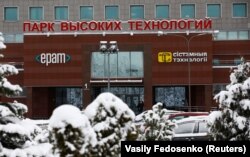Belarusian software engineer Pavel Liber never cared much about politics. For those who work with variables, Belarus’ never-changing elections offered little. But this summer, when he saw a handful of potential alternatives to President Alyaksandr Lukashenka, the country’s leader since 1994, Liber finally got interested.
“I realized that I have some kind of inner desire to help, to intervene in this process, to apply my engineering skills in order to do something useful,” he said.
The result was Golos (Vote or Voice), a vote-count-verification bot, created by some 40 Belarusian IT volunteers, that the Belarusian government ultimately banned as “a shadow Central Election Commission.” A week before Belarus’ August 9 presidential vote, some 1 million voters had agreed to photograph their marked ballots for the Golos project as a check against potential election falsification.
But these principles came at a price.
Ahead of the election, Golos co-developer Liber, on leave as senior director of software engineering in Minsk for the U.S. firm EPAM Systems, had to leave Belarus for neighboring Ukraine for his own safety, he said. Seven local Golos volunteers are now in detention.
Liber, and other IT professionals like him, apparently had violated the unspoken condition for the "quite comfortable" environment for IT companies in Belarus: staying out of politics.
Since 2005, Minsk’s Hi-Tech Park, a free economic zone and physical complex, has granted long-term exemptions from taxes on profits, customs duties, and VAT, among other benefits, to hundreds of such enterprises.
These companies’ employees pay only a 9 percent income tax on salaries that average four times the size of the national monthly salary of approximately $450.
The perks have paid off for the economy: In 2019, the country’s IT companies generated $2.5 billion in export revenue, according to President Lukashenka.
The sector is estimated to have contributed to 5.7 percent of Belarus’ nearly $60 billion economy in 2018, according to official figures.
A 2020 report by the non-governmental Minsk Dialogue think-tank estimated that portion could rise to 10 percent by 2022.
Against that backdrop, the IT community “tried very hard to believe” that Belarus could, in fact, become "an IT country," and that the Hi-Tech Park was “an island of safety and reliability,” Belarusian-born Mikita Mikado, the co-founder of PandaDoc, a rising U.S. sales-documentation-software startup, commented on Instagram earlier this month.
"That if we stayed out of politics, we wouldn't be touched," he wrote.
For Mikado, that belief came to an end about a month ago.
After Belarusian police were shown brutally beating demonstrators against President Lukashenka’s alleged landslide re-election, Mikado taped a video in which he offered financial support for members of the Belarusian security forces who opposed the violence but could not afford to speak out. He later also offered IT-training.
“I just couldn’t stand on the side, and I wanted to do something,” Mikado told Current Time. “I didn’t believe, and up to this moment do not believe, that all police officers and all soldiers are bad. That’s not the way it is.”
Yet after Mikado’s anti-violence video appeal, police searched PandaDoc’s Minsk office and detained four employees on criminal charges of supposedly cheating the state out of 107,000 Belarusian rubles (about $41,150).
Mikado underlines that these employees had nothing to do with his offer to security-forces employees. He sees the charges as an attempt to push him to retract his proposal.
PandaDoc has refused. On September 5, Mikado stated on Instagram that the company will take its 250 employees out of Belarus and move elsewhere.
“We will fight,” he said.
Increasingly, other IT professionals – whether for principles or profits – are considering leaving Belarus as well.
Mikhail Chuprinsky, the Belarusian co-owner of Rozum Robotics, is among them.
When protests broke out on the night of August 9 near his residence by Minsk’s Pobeda (Victory) Square, he was scooped up by police with scores of others.
Chuprinsky spent 15 days in prison, initially in Minsk’s Akrestina facility, now notorious for its reported mistreatment of detainees.
There, he was among 47 men squeezed into a cell for five people, he told Russian journalist Yelizaveta Osetinskaya in an August 31 YouTube documentary about IT specialists who oppose Lukashenka.
Transferred to another prison, he was beaten by riot police. His benefits as an IT professional apparently sparked his assailants’ ire.
“They asked, ‘How much did they pay you? How much do you earn? This isn’t much for you? You wanted changes? There’ll be changes now!’” Chuprinsky told Osetinskaya.
If Lukashenka’s inauguration goes ahead, he said, “this will be for me, personally, a point of no return,” and sufficient reason to move Rozum Robotics out of Belarus.
Already, others, wary of surprise police searches, detentions, and potential international sanctions, are making or have executed similar plans.
The Minsk offices of Russian-owned Yandex, an Internet firm with close links to the Kremlin, and U.S. courier app Uber were the first subjected to police searches after the election on August 13. No detentions occurred, but Yandex opted to move some of its staff to Russia and others to locations in the Minsk suburbs.
The Wargaming Group, a Cyprus-headquartered company that produces military video games, also has begun to work out a plan to relocate part of its employees to Kyiv, St. Petersburg, or Nicosia, the Cypriot capital.
For some, it comes down to the question of Internet outages – a phenomenon that at least one senior government official indicated was planned in case of “a direct threat to the country’s security.”
For London-based software developer Godel Technologies, the days-long outage and slowdown that started on Belarus’ August 9 election day led to “malfunctions” in production, snagged client communications, and “significant financial losses," the company’s chief operations officer, Andrew Afanasenko, said in a statement.
Consequently, “to minimalize the risks,” Godel Technologies, which has offices in five Belarusian cities, is now considering a partial move to Ukraine.
Aside from Ukraine, a larger IT outsourcing market, other IT companies are considering European Union neighbors Latvia, Lithuania, and Poland for such a transition.
For its part, Latvia’s Investment and Development Agency has begun to recruit Belarusian companies outright; the agency claims that dozens of companies have signed on, Delfi.co reported.
Others, though, are still biding their time.
After 27 years in Belarus, EPAM Systems does not plan to leave, Minsk native Arkadiy Dobkin, the company’s chief executive officer, chairman of the board, and president, told journalist Osetinskaya. Instead, it plans to “transform” itself.
“We’ll see what happens,” Dobkin said.
Despite these discussions, the Belarusian government does not appear to have launched any public campaign to urge such tech companies to stay put.
Any IT exodus, though, would hit at a time when the Belarusian economy can ill afford to lose revenue.
The World Bank has estimated that the COVID-19 pandemic will cause Belarus’ Gross Domestic Product to shrink by 4 percent this year – the economy’s largest decline since 1995.
The country has not been able to reach an agreement with the International Monetary Fund about $940 million in support to help the economy weather the pandemic.
Meanwhile, despite an order from Moscow for Russian banks to help ease the credit crunch, Belarus’ currency supplies are running low.
Its foreign currency reserves have decreased to about $4.3 billion – enough to cover its import costs for just under a month and a half, well under the recommended three-month minimum, economist Anders Aslund wrote on September 7 for the Atlantic Council.
Belarusian-ruble-denominated funds also are now limited.
One owner of a network of shopping centers, Uladzimir Zakharou, told Current Time that several Belarusian banks are now offering “to buy money” for 24-percent interest rates – roughly three times the standard rate.
Loans for construction or reconstruction projects were stopped at the country’s largest bank, the majority-state-owned Belarusbank, on September 10.
In the past, Belarus’ IT sector provided somewhat of a cushion against economic crises – as the president himself, who touted its “enormous input” into the Belarusian economy, acknowledged before the election.
He still claims the sector’s professionals should have no cause for complaint.
“Tell me, what do IT specialists need? We’re still figuring it out. Tell me, what do they need?” Lukashenka asked his audience on September 1 at a service-industry training school in the western city of Baranavichy. “I’ve already created paradise for them.”
For a president who has declared “not allowing destabilization” as his priority, there is only one explanation for Belarusian IT professionals’ criticism of his government: “They say they want to be in power,” he alleged.
As yet, the only high-profile Belarusian IT figure who has publicly expressed a desire for power is Valer Tsapkala, a former ambassador to the U.S. who was denied registration as a presidential candidate.
Tsapkala, who fled to Russia in July to escape criminal prosecution, ran Minsk’s Hi-Tech Park for 12 years, from its 2005 start.
Ironically, one of the reasons for the Park’s creation was to make sure Belarusian tech talent did not emigrate.
But now, given the situation in Belarus, EPAM Systems’ Dobkin told Osetinskaya, “It’s possible that this will be the biggest exodus of this category of people from the country for the last 30 years …”
- With additional reporting from BelTA, CTV, and Reuters
















Facebook Forum